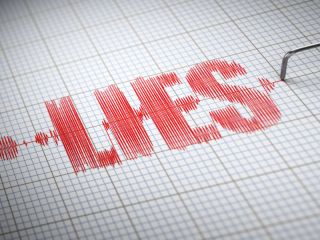Deception
(Dis)Honesty—The Truth About Lies
A new documentary to help us better understand lying and self-deception
Posted June 16, 2015

“The bigger the brain, the larger the capacity to lie.”
–Murali Doraiswamy, MD
From seemingly small white lies to full-blown criminal confabulations, lying permeates human behavior. For example, most people believe that they are better than average drivers, which is clearly not statistically possible! People lie on their taxes and justify it in a myriad of ways, such as telling themselves that the government gets enough money and no one will ever find out. And they lie in their online dating profiles—about just about everything!
CNBC recently aired a fantastic new documentary called (Dis)Honesty – The Truth About Lies. Based mostly on the research of Dr. Dan Ariely, Professor of Psychology and Behavioral Economics at Duke University, this film explores how, when, and why people lie (see thedishonestyproject.com). Interspersed with research and academic commentary on lying are first-person accounts of deception: a wife cheating on her husband, a professional biker who used steroids to stay competitive, an illegal Wall Street trading partnership. What all of the stories and research have in common is that they demonstrate the human tendency to lie—and show how we use self-deception to justify our lies.
Dr. Ariely argues that lying is one core example of human irrationality—ways that we think in non-logical ways. Theoretically, we are torn between honesty and self-protection. On the one hand, we want to think of ourselves as decent, honest individuals, which is not consistent with being a liar. On the other hand, we want to justify being dishonest when it is self-beneficial or protects us from painful truths. Consequently, we try to walk a fine line between being honest and being dishonest, between acting in accordance with reality and tweaking that reality. Psychologically, as long as we lie “just a little bit” and justify our lies to ourselves, we are protected from seeing ourselves as dishonest. Dr. Ariely calls this the fudge factor—the amount that we can lie and still think of ourselves as good, honest, virtuous people.
Dr. Ariely’s description of the fudge factor illustrates the important link between bold-faced lying and self-deception. When we knowingly lie, we justify our lie with a self-deceptive lie to continue to feel good about ourselves (Warren, 2014). For example, we may say:
-I don't lie very often. So it is not really a comment on my character.
-Everyone cheats sometimes. So why shouldn’t I?
-I am not getting my needs met in my relationship. So I am going to go elsewhere for attention without telling my partner.
-I am not directly hurting anyone. So it isn’t really a problem.
-I deserve better. So I will do what it takes to get it.
The film also highlights that lying is very socially normative and culturally reinforced. From corporate scandals like Enron to steroid use in professional sports to political deception about torture, weapons of mass-destruction, and sexual behavior, lying is everywhere in mainstream media and culture. Often, we see powerful companies and political figures lie without any obvious consequences to the liar. Seeing others lie—without repercussion—makes it easier for us to justify why lying is okay for us as individuals.
So, where do we go from here? A large body of research and psychological observations suggest that we all lie to ourselves and others. It seems to be part of human nature. As such, our tendency to lie will never go away. So now what?
I do not think it is realistic to think we will ever stop lying to ourselves entirely. Rather, the goal is to become more aware of our lying—when, how and why we lie—and to reduce our fudge factor. As we become more self-aware, we learn to spot our lies before we repeat them or they spiral out of control. We also become empowered to make choices—about who we want to be and how we want to live our lives (Warren, 2014).
The Naked Truth Is This: In addition to describing some great psychological research on lying and self-deception, (Dis)Honesty – The Truth About Lies provides a compelling, first-hand look at how lying and self-deception operate in our lives. It is a must-see for anyone interested in understanding lying and self-deception.


